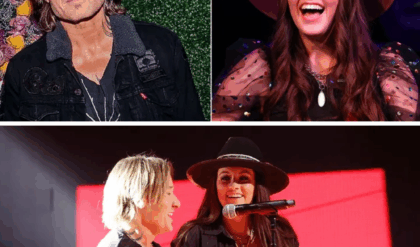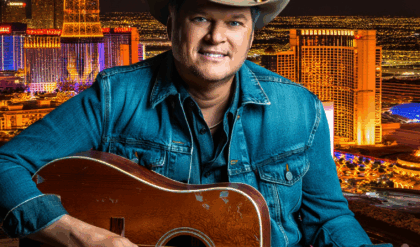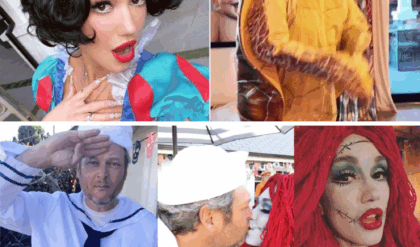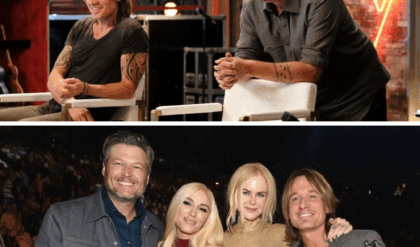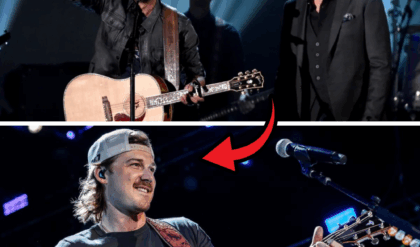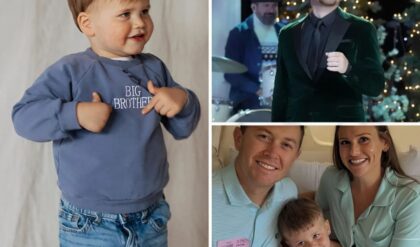The confetti cannons stayed silent, the pyrotechnics unlit, but on the evening of October 6, 2025, NBC’s The Voice studio in Universal City erupted in a different kind of magic—one woven from the humid strains of a harmonica and the lilt of a language older than the show itself. After 28 seasons of soul-shaking belts, genre-bending risks, and tear-jerking origin stories, the competition finally witnessed something unprecedented: a performer who didn’t just audition but summoned the spirit of Louisiana’s bayous, blending English soul with Cajun French patois in a way that felt both timeless and electric. Dustin Dale Gaspard, a 33-year-old singer-songwriter from the speck of a town called Cow Island, didn’t arrive with a polished demo reel or a viral TikTok following. He came with a beat-up acoustic guitar, a rack harmonica dangling from his neck like a talisman, and a voice that carried the weight of sugarcane fields and Saturday-night fais-do-dos. His rendition of Sam Cooke’s 1962 classic “Bring It On Home to Me” started as a familiar plea for redemption but morphed midway into something utterly foreign to the show’s history—a verse delivered in fluid Cajun French, raw as roux and alive with ancestral fire. Within seconds, all four coaches—Reba McEntire, Niall Horan, Michael Bublé, and Snoop Dogg—slammed their buttons in near-unison, spinning to reveal faces alight with astonishment. What they said next? It wasn’t just praise; it was a seismic shift, a collective recognition that this unassuming Cajun had cracked open a door to a sound the world was starving for.
The studio audience, a kaleidoscope of hopefuls, superfans in team jerseys, and wide-eyed families, had been primed for the usual dazzle. The Voice Season 28, which kicked off on September 22 under the glow of those iconic red chairs, promised a fresh lineup: McEntire returning for her fourth go-round after a season away filming her sitcom Happy’s Place; Horan, the ex-One Direction crooner, reclaiming his seat post-tour hiatus; Bublé, the velvet-voiced Canadian, anchoring his third straight year; and Snoop Dogg, the West Coast icon, bringing his second-season swagger after sitting out the spring cycle. Host Carson Daly, ever the steady hand through 14 years of drama, teased the night as “Blind Auditions, Part Five,” a segment already stacked with standouts like a teenage operatic phenom from Georgia and a bluesy baritone from Chicago. But when Gaspard shuffled onstage—tousled brown hair framing a face etched by road miles, his flannel shirt untucked over jeans faded from wear—the energy shifted. This wasn’t theater-kid polish or pop-star sheen; it was the grit of someone who’d gigged in Abbeville dive bars and house parties where the dance floor was a sagging porch.
Born in 1992 amid the marshy expanse of Vermilion Parish, Dustin grew up in Cow Island and nearby Mouton Cove, hamlets so rural that asphalt is a rumor and the population hovers around 200 souls—give or take the alligators Dustin affectionately dubs “swamp puppies.” His childhood soundtrack wasn’t Spotify algorithms but the live-wire pulse of Acadiana: accordions wheezing at trail rides, fiddles scraping under live oaks heavy with Spanish moss, and his father’s old vinyls spinning Sam Cooke alongside Clifton Chenier and Doug Kershaw. Music was no elective; it was embedded in the culture, a bilingual lifeline where English handled schoolyard scraps and Cajun French—le français cadien, a patois born from 18th-century Acadian exiles—whispered family secrets and heartache hymns. Dustin’s dad, a rough-knuckled shrimper with a penchant for storytelling, handed him a guitar at age 10, its strings buzzing like cicadas. “Play what you feel, mon fils,” he’d say, and Dustin did—first mimicking the swamp pop of local legends like Rockin’ Dopsie, then weaving in the gospel grit of Cooke, whose butter-smooth tenor had long bridged Black soul and white country divides.
By high school, Dustin was scribbling lyrics in spiral notebooks during geometry, verses about lost levees and first crushes under pecan trees. College at the University of Louisiana at Lafayette lasted a semester; the pull of the stage was stronger than syllabi. He dropped out to chase gigs, forming a loose collective called the Dustin Gaspard Band that fused Americana roots with Cajun swing—think Van Morrison’s soulful ramble meets the rollicking joy of a zydeco jam. His debut album, Hoping Heaven Got a Kitchen, dropped in March 2022, a 10-track love letter to Vermilion Parish: songs like “Swamp Witch Blues” conjuring gator hunts gone wrong, “Cajun Moon Rising” painting moonlit two-steps with banjo plucks and thumping bass. Recorded in a Lafayette garage studio on a shoestring, it caught fire regionally, spinning on KRVS public radio and landing him slots at the Festival Acadiens et Creoles. Critics, few but fervent, dubbed him a “bayou bard,” praising how his baritone—gravelly yet tender—carried the weight of place without pandering to tourist tropes.
Life as a touring troubadour isn’t red carpets and rider demands; it’s 10,000-mile hauls in a rattling Ford F-150, the bed rigged with a foam mattress and a cooler of boudin links. In 2025 alone, Dustin logged those miles with Pennsylvania banjo whiz Tanner Bingaman, a duo trek from the Pacific Northwest’s misty festivals to Alberta’s barn dances, where Mounties two-stepped to his French-inflected covers. He’d park at Walmart lots when motels pinched, strum for tips at Houston house concerts that turned into all-night jambalaya feasts, and wake to the hum of cicadas plotting his next setlist. “The road’s my church,” he’d tell fellow travelers over weak coffee. “It strips you down to the songs that matter.” Bilingualism was his secret weapon: originals like “Arrête Ça” (a rollicking plea to quit chasing ghosts) drew French-speaking crowds in Quebec, while English tracks like “Bayou Lullaby” hooked Nashville song circles. He’d busk the French Quarter during Mardi Gras, hat out for doubloons that bought gas, his harmonica wails cutting through brass bands like a call to prayer.
Word of this wandering wizard reached The Voice producers via a grainy audition tape shot in his truck cab—phone propped on the dash, him rasping Cooke’s “A Change Is Gonna Come” with a Cajun twist. It was enough for the golden ticket to L.A., though Dustin nearly bailed, citing Mateo’s preschool schedule back home (no, not his son—a nod to the loyal lab who rides shotgun). But the itch won; he flew coach, guitar as carry-on, heart pounding like a snare drum. Backstage on audition night, nerves jangled as he watched a soulful teen from Atlanta snag a three-chair turn. “This ain’t Abbeville,” he muttered, but when Daly called his name, something ancestral clicked. Striding out in boots caked with red clay, he slung the harmonica rack over his neck, cradled the guitar, and launched into “Bring It On Home to Me.” The opening wail—pure, plaintive—hung in the air like marsh mist. His fingers danced the strings with unhurried grace, voice dipping into that Cooke falsetto, rich as étouffée.
Then, the pivot: midway through the bridge, Dustin slipped into Cajun French. “Ramène-moi chez moi, chère,” he crooned, the words a melodic gumbo of “Bring me home to you,” infused with the rolling r‘s and nasal vowels of his forebears. The harmonica solo followed, a train-whistle keen evoking steamboats on the Mermentau. It was no gimmick; it was genesis, the first time The Voice—in 28 seasons and hundreds of auditions—had heard Cajun French sung onstage. The coaches, backs turned, felt it viscerally: McEntire’s boot tapping involuntarily, Horan’s head nodding, Bublé’s fingers drumming the chair arm, Snoop’s shades slipping as he leaned in. Buttons slammed—thwack-thwack-thwack-thwack—a four-chair cascade faster than any in recent memory. The audience leaped, a roar drowning the applause sign.
When they spun, the reactions were a masterclass in stunned reverence. Horan, first to speak, his Irish lilt bubbling with boyish awe: “Mate, that’s a proper unique voice—full of character, like nothing I’ve heard facing away. You could sing ‘Baa Baa Black Sheep’ and it’d break hearts. Please pick me; I love you.” McEntire, eyes sparkling under her signature fringe, leaned forward: “Boy, you’re different, unusual, refreshing—and you can sing and play like the devil’s after you. We Southern girls know grit; come to Team Reba, and we’ll cook up some magic.” Bublé, ever the showman, flashed a grin and tossed out a smattering of Quebec French—”C’est magnifique, Dustin!”—before adding, “You’re what the people are asking for. Authenticity like that? It’s rare as hen’s teeth. Join me; we’ll swing it big.” Snoop, puffing an imaginary blunt for effect, dropped the mic: “Fo’ shizzle, that touched my heart, dawg. Got family in Mississippi and Louisiana—uncles wrestling gators, dodging snakes like yours. Your soul’s real; that’s West Coast meets bayou. Team Snoop, let’s blaze trails.”
The scrum was electric, coaches overlapping in a cacophony of pitches—Horan promising pop edges to his roots, McEntire vowing country kinship, Bublé dangling jazz flair, Snoop invoking cultural collabs. Dustin stood center, humble grin cracking, harmonica glinting under the spots. “Y’all are too kind,” he drawled, thick Vermilion accent wrapping the words like kudzu. “This song… it’s home. Cooke’s plea for love, but in French, it’s family calling you back.” He paused, eyes scanning faces etched with genuine hunger—not for a trophy, but for him. The choice lingered, tension thick as gumbo roux, until he nodded toward Horan: “Niall, your passion hits different. Team Niall it is.” The Irishman whooped, leaping to envelop him in a bear hug, while the others groaned good-naturedly—McEntire mock-pouting, “Dang, I had the étouffée ready!”
What followed aired like lightning in a bottle, the segment clipping social feeds before credits rolled. #CajunVoice trended nationwide, clips of the French switch-up racking 10 million views overnight. Swifties dissected lyrical parallels to folklore’s rustic tales; country purists hailed it a “swamp pop revival.” Back in Cow Island, Dustin’s phone buzzed off the hook—old gig bookers offering festival slots, a Lafayette radio DJ spinning his album till dawn. His bandmates, watching from a packed Abbeville bar, texted grainy cheers: “Mon, you put us on the map!” For The Voice, it was a milestone: first Cajun French, yes, but more—a reminder that after 28 seasons, innovation hides in the unlikeliest accents.
As Battles loom, Dustin’s already sketching duets—maybe a zydeco twist on Horan’s “This Town,” or a bilingual battle with a teammate. “This ain’t the end,” he told Daly post-choice, slinging his guitar. “It’s the levee breaking wide.” In a show built on voices, Dustin Dale Gaspard didn’t just turn chairs; he turned the tide, proving the bayou’s soul runs deeper than any spotlight. From Cow Island’s whispers to national roars, his sound—raw, ancient, alive—echoes a truth: some music doesn’t need invention; it just needs to be heard.
